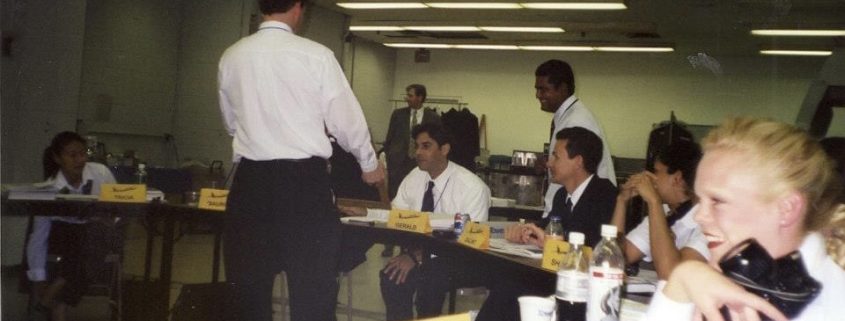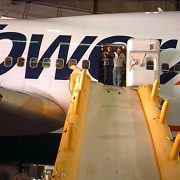Lesson plan and its importance
Lesson plans and their importance
The lesson plan is a necessity to the successful completion of any training conducted. All flight attendant training curriculums are approved by the Civil Aviation Authority (CAA) of that country. The approval granted has more meaning than just the CAA saying we agree with it, go forth and train people. When the CAA signs and approves the flight attendant training curriculum, it is acknowledging that the curriculum is designed per the regulatory requirements as applicable to the operation. With that approval, that certificate holder is obligated to conduct their flight attendant training and all listed subject matter within that curriculum for each class. The approval requires full compliance, and to a degree, you could say it has the effectiveness of then being its own regulation. If you do not teach your flight attendant training program per the approved curriculum, you can violate your own training program.
Teaching flight attendant training per the approved curriculum does not mean that all subjects must be taught in the exact sequence as listed in the approved curriculum. The approved curriculum outlines all the subjects that will be taught during the different categories of training. Certain core subjects must always be taught in different categories of training, be it in initial training, recurrent training, and requalification training. The approved curriculum must be designed so that the core subjects are taught, but not always necessarily go down to the granular level of content. Airlines should have enough flexibility to be able to revise their course content and provide certain different content in alternating years to keep the training fresh and not require a revision to the approved curriculum each time a change is desired. This is where the lesson plan comes into consideration.
The lesson plan is where you have some flexibility to design and adjust your training program while meeting the curriculum requirements. The different subjects can be shifted around as found to be appropriate or needed in the event of equipment or guest speaker availability. Some things cannot be avoided and most, if not all CAA inspectors would understand this and not find it a problem. Where it does become a problem is when the instructor has a lesson plan and either does not follow the lesson plan which can lead to skipping of required content, or the instructor begins to unnecessarily shift around the flow of the content to their own individual liking. For some subjects, it is most advantageous to teach the courseware in a specific flow because one subject leads into the next and the flow complements the overall lesson. It is important to conduct training in such a sequence as it makes logical sense to the trainee. As an instructor, knowing and understanding all the course content, a shift in sequence may not seem to be an issue for you, however, it could end up causing some confusion to the new-hire trainee. You won’t necessarily know this because the trainee doesn’t know better, they assume everything is being taught the way supposed to be taught.
Often, such errors are or can be identified when department training audits are conducted. Additionally, these errors can also be identified and self-corrected when there are two instructors together teaching a flight attendant training class. Those are effective ways of ensuring that the training conducted remains consistent and all required course content is taught the same to each class, notwithstanding each instructor’s additional input. Where a problem can occur, and you really don’t want this to happen, is when your CAA observes your training classes, finds that you missed certain subjects, and needs to tell you what you missed because you don’t know. Inspectors observe flight attendant training to validate that the training was appropriately conducted and will sometimes identify opportunities for improvement or an element of one subject that could be taught better, they are not intended to be quality control of training for each airline. The responsibility of quality control lies within the airline itself as they themselves are responsible for the conduct of all of their training programs.
When training is observed by a CAA inspector, perception of the training program can be affected by how the training is conducted, the organizational skills of the instructor(s) teaching that training course, and how that instructor interacts with the inspector. When training is conducted, each instructor needs to have with them the lesson plan for that day, or better yet, for each day covered to complete that training course. A proactive instructor would take the initiative to ask the inspector if they have a copy of the lesson plan at least for that day, or the entire course if they will be observing multiple days. While there’s nothing wrong in waiting for an inspector to ask for a lesson plan, it’s a small demonstration of professionalism and knowledge by the instructor that they know the inspector is there to audit their program and will be carefully following along with the lesson plan. If the Inflight Training Manager did not provide one to the inspector, you can be assured they will be asking for one when they are there.
During breaks is the likely time that an inspector will approach the instructor and let them know if there was anything that could be better explained or may have been missed for that subject, which allows the instructor to self-correct and address the issue to the class. Minor findings are somewhat standard, and as an instructor, you can almost expect to have some findings or suggestions for improvement. This is not necessarily negative, especially if the instructor is open to constructive feedback. Where problems and perhaps a reduction in confidence in the instructor or instruction provided to the class arises is when the CAA inspector observes training, the instructor and the inspector both have a lesson plan, and that the end of the day, the instructor asks if they missed anything. That in itself can raise warning flags which may lead to additional oversight. Why? That one simple question, “what did I miss?” tells the inspector that the instructor is not paying attention to their lesson plan and is not ensuring that their training class remains consistent and complete.
Let’s take a look at two different interactions from an instructor to the inspector watching their training program. Some content was not covered as scheduled for that day and it is the end of the day briefing with the instructor.
Inspector, “So, how do you think today’s training went?” The instructor responds with, “Today I ran out of time and was not able to teach X & Y. Those two topics will be taught tomorrow first thing in the morning before I begin the scheduled lesson plan for Tuesday. As for everything else, I think today went well and I covered everything and I’m open to feedback to enhance training. Do you have any suggestions for me?” Compare that to, “I think it was good. So, what did you think of today’s training? Did I miss anything?” The first statement instills confidence in the inspector that the instructor is paying careful attention to their scheduled lesson plan and is ensuring that all topics are being covered, not leaving any room for error or skipping of topics. They also want to self-improve and welcome suggestions to better themselves. The second response, while demonstrating openness to feedback and a willingness to correct, erodes the inspector’s confidence in that instructor and potentially the ability of that airline to ensure consistency in training.
Why does it erode inspector confidence in the instructor? The instructor should have been paying attention to all the subjects they taught and they themselves should know what they missed. This can leave the inspector feeling that without oversight, anyone trained under that instructor is not necessarily going to receive 100% of all the required training as outlined in their lesson plan because the instructor is not paying attention to their schedule, and even though it is primarily a direct reflection on that instructor, the negative consequences that can arise through inadequate instructor performance can potentially affect the approved training program. The Manager or Director of Inflight Training has ultimate responsibility for the quality of the training program and delegates the authority to teach to each instructor acting for Inflight Training management. The instructor must ensure that they keep track of all subjects required to be covered to ensure consistency in training.
While prevention of an instructor conducting training without following their designed lesson plan cannot be 100% guaranteed, especially when not being monitored by someone else, training departments should be proactive and self-audit their instructors. This allows Inflight Training management to take corrective action without any CAA involvement. The first way of preventing these types of events from occurring is during initial instructor training received prior to teaching their first class. The new instructor curriculum should include all information about training requirements, as well as the requirement to follow the lesson plan as designed and make note of any changes that occur when teaching, e.g. a schedule shift due to equipment or guest speaker availability. The same subjects, particularly about the importance of following the lesson plan, should be included during annual recurrent instructor training. The importance of a well-designed lesson plan and following the design of that lesson plan cannot be overstated. Lesson plans are a necessity to ensure consistency in training, to ensure all subjects scheduled for that curriculum are covered, and to assure the CAA that provides oversight that you, the airline, are proactive in the quality control of your training program.
Ultimately, instructors must follow the design of their lesson plan, and if there are any identifiable issues with it, it should be discussed internally for correction. As training programs are taught, you may find that certain content flows better when put in a different sequence. When this is the case, edit the lesson plan to improve the flow! Whatever you do, instructors must not change the lesson plan just to meet their needs because flight attendant training must be consistent for all training classes. Follow the lesson plan to achieve a positive outcome. Ignore the lesson plan and it exposes you to errors made and inconsistency in training, which is undesirable and contrary to the approved curriculum.









Leave a Reply
Want to join the discussion?Feel free to contribute!